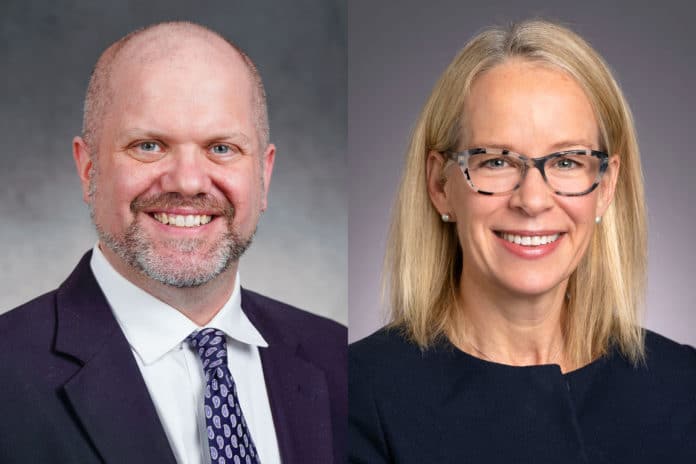
While a group of DFL legislators has renewed their efforts to make Minnesota the 11th state in the nation to allow some terminally ill people to self-administer medication that would end their lives — they are receiving expected pushback from right-to-life groups. Organizations that oppose the proposed legislation are calling it an “assisted suicide bill.”
Rep. Mike Freiberg and Sen. Kelly Morrison presented the bill, SF1813/HF1930, they’ve coined the “End of Life Options Act” in a press conference on Thursday at the State Capitol.
The Golden Valley state representative and Deephaven state senator were joined by locally-based advocates for the legislation, which is being backed by the national “Compassion and Choices.” The Oregon-based organization, once known as the Hemlock Society, is helping push similar legislation in more than 30 other states. Oregon is well known for becoming the first state in the nation to enact “right to die” laws for certain terminally ill patients.
In addition to Oregon, other states that have enacted similar legislation include: Washington, Montana, Vermont, California, Colorado, Hawaii, New Jersey, Maine and New Mexico. Washington, D.C. also has a similar law in place.
Twenty other DFLers in the House co-sponsor the bill. DFL co-sponsors of the bill in the Senate include: Alice Mann (Edina), Jim Carlson (Eagan), Erin Murphy (St. Paul) and Liz Boldon (Rochester).
No Republican has signed onto the bill.
DeeDee Welles, who is suffering from ovarian cancer, supports the proposed legislation. She joined Freiberg and Morrison at the Thursday press conference and spoke about her experience watching her mother die of the same disease.
“When I was 27 years old, I watched my mother die of ovarian cancer; a horrible experience for her and me and my siblings,” said Welles, of Vadnais Heights. “I know that I would feel great relief in knowing that I would have a peaceful alternative to the agony my mother endured.”
No specific waiting period required
So what would that “peaceful alternative” entail? And how would the bill introduced by Freiberg and Morrison determine who would qualify for being able to receive such “medical aid in dying?”
According to the language of the bill, a person who is at least 18 years old, deemed mentally capable by certified medical professionals and who has received a prognosis of less than six months to live due to a terminal illness would have the right to be prescribed medication they can self-administer that would end their life. The individual must go through a list of several informed consent-related instructions with a medical professional. The proposed legislation would require the patient to express one oral request and two written requests to receive “medical aid in dying” medication. Most patients mix the medication with apple juice or administer it with the push of a plunger button into a feeding tube, according to medical professionals who back the proposed legislation. The proposed legislation does not require a medical professional to be present when an individual self-administers the medication.
The provisions contained in SF1813/HF1930 would differ somewhat from the 1998 Oregon law, known as the “Death with Dignity Act,” according to Freiberg and other DFL legislators who have sponsored the bill in some form or another dating back to the 2015 legislative session.
Unlike other similar legislation that’s been enacted across the country, Freiberg’s bill would allow for nurse practitioners, in addition to medical doctors, to prescribe the “medical aid in dying” medication to those who seek it. The proposed legislation also does not include a mandatory waiting period between an oral or written request by the patient to receive “medical aid in dying,” which in other states can range from 48 hours to 20 days.
Opponents say legislation is ‘dangerous, misguided and extreme’
Last year, Rep. Freiberg joined a panel of medical professionals and advocates for “medical aid in dying” legislation at a University of Minnesota Center for Bioethics-sponsored event. During the seminar, Freiberg said “that many people who are prescribed the medication don’t actually use it.” According to data from the state of Oregon, out of more than 400 people who sought and received “medical aid in dying” medication in 2020, less than 250 used it.
Minnesota Citizens Concerned for Life says the “dangerous, misguided and extreme proposal” would effectively legalize assisted suicide in Minnesota and said it poses a danger for people who suffer from depression while facing a terminal illness.
“The bill says only patients with a prognosis of six months or less to live are eligible, but these predictions are often unreliable,” said Cathy Blaeser, MCCL co-executive director. “In states with similar laws, some patients qualifying for assisted suicide have gone on to live for years.”
Hank Long
Hank Long is a journalism and communications professional whose writing career includes coverage of the Minnesota legislature, city and county governments and the commercial real estate industry. Hank received his undergraduate degree at the University of Minnesota, where he studied journalism, and his law degree at the University of St. Thomas. The Minnesota native lives in the Twin Cities with his wife and four children. His dream is to be around when the Vikings win the Super Bowl.















